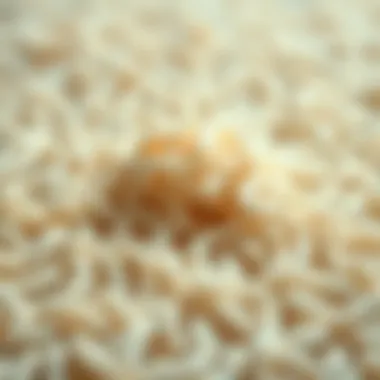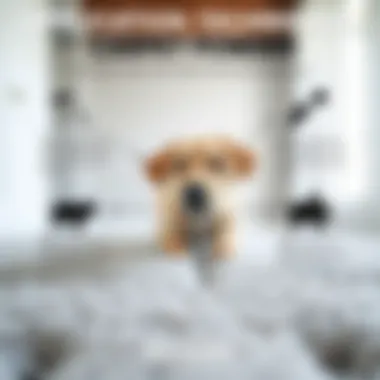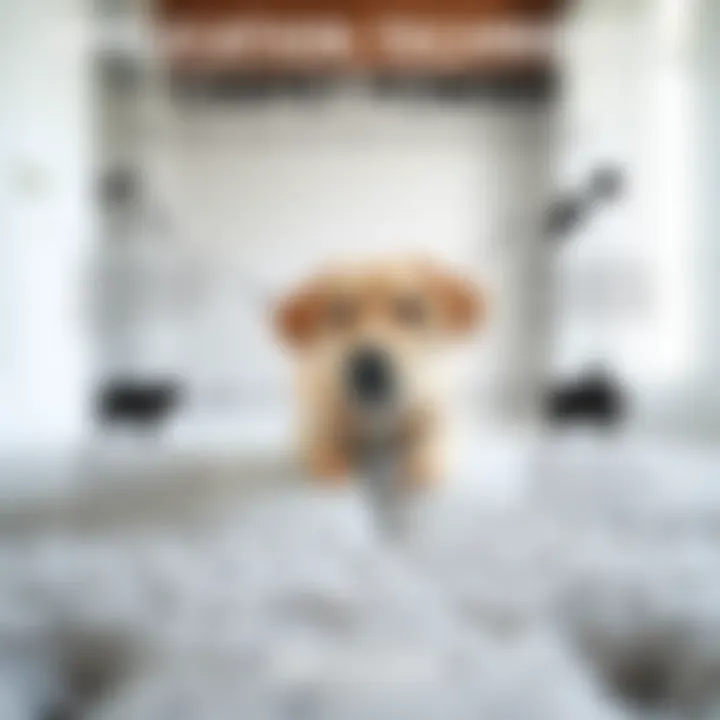Managing Dog Urine Odors with Carpet Powder Solutions


Intro
If you’ve ever found yourself crinkling your nose in response to a pungent scent wafting through the air, then you know all too well the challenges of managing dog urine odors in the home. It's a common issue many pet owners face, transcending the simple nuisance of unpleasant smells. Understanding how to tackle this problem not only enhances your living environment but also contributes to your pet's well-being.
In this article, we dive deep into an often-overlooked solution: carpet powder. Specifically formulated to combat dog urine odors, carpet powders have proven effective for many. We will unpack the science behind these products, explore application techniques, and discuss the various options available, from natural solutions to commercial products. Our aim is to provide a thorough grounding in how carpet powder can be a valuable asset in your pet care toolkit, ensuring your home remains fresh—a necessity for both you and your furry companion.
Understanding Pet Odors
Pet odors, particularly those associated with dog urine, can be a significant concern for pet owners. Understanding the underlying factors that contribute to these odors is critical for managing them effectively. When we consider the dynamics of pet odors, we delve into a mix of biology, chemistry, and human behavior that impacts our living spaces. Knowing these aspects not only helps in keeping our homes fresh but can also significantly enhance the quality of life for both pets and their owners.
For instance, dog urine comprises various elements including urea, creatinine, and uric acid. These substances can become particularly pungent when they interact with the fibers of carpets and rugs. This interaction is more than just a mere scent; it often permeates the structure of the carpet itself, creating an ongoing challenge for pet owners.
What Causes Dog Urine Odor?
Let’s break it down—the smell of dog urine is primarily caused by the combination of waste products and the natural odors emitted by the dog's body. When dogs waste, their urine contains compounds produced during digestion and metabolism. Urea, a major component, is a colorless, odorless compound, but as it breaks down, it releases ammonia, which is notorious for its sharp smell.
Additionally, factors like the dog's diet, age, and hydration levels can greatly influence the intensity of the odor. For instance, a protein-heavy diet may generate stronger odors compared to a balanced one. It's crucial for pet owners to recognize that the diet can play a significant role in the odors that linger in their homes.
Impact of Pet Urine on Carpets
The impact of pet urine on carpets can be somewhat of a double whammy. First, there's the obvious olfactory concern—the smell itself. However, the consequences extend beyond what meets the nose. The urine can cause discoloration on carpet fibers, potentially ruining expensive pieces in your home. The uric acid, in particular, crystals may embed deep within the carpet. When they crystallize, they can lead not only to persistent odors but also trigger reactionary cleaning efforts that often fail to truly neutralize the scent.
Moreover, if not addressed promptly and effectively, pet urine might lead to secondary problems such as mold or mildew, especially if moisture is involved. It creates an unhealthy environment—not just for the inhabitants but for guests too. For pet owners, this emphasizes the importance of timely and effective cleaning solutions to manage odors and prevent long-term damage.
Understanding these nuances surrounding pet odors not only equips pet owners with the knowledge needed to tackle them, but also fosters an environment where both pets and humans can coexist comfortably. Addressing dog urine odor is not just a matter of preference—it's about maintaining a pleasant and healthy living space.
The Role of Carpet Powder
In pet ownership, managing odors can often feel like an uphill battle, especially when it comes to dog urine. It's not just about cleanliness; it’s a matter of comfort for both the pet and the owner. Here, carpet powder plays an essential role. It can make a significant difference in keeping your living space fresh and inviting, while also being harmless to your beloved canine companions.
A good carpet powder not only tackles the unpleasant smell but also targets the underlying stains, breaking down the compounds that contribute to those stubborn odors. When paired with effective cleaning techniques, these powders can enhance the overall hygiene of your home. Choosing a carpet powder designed for pet-related issues is imperative, as standard carpet cleaners may lack the potency needed for effective odor control.
Moreover, utilizing carpet powder can save you from costly deep-cleaning services. By understanding and applying these products effectively, pet owners gain a valuable tool in maintaining a clean and odor-free environment, all while nurturing a safe space for their furry friends.
What is Carpet Powder?
Carpet powder is a specialized product designed to absorb odors and clean carpets. Typically, it comes in a dry form, which allows it to penetrate the carpet fibers effectively. When applied, carpet powder binds to particles that contribute to odors, helping neutralize them over time.
There are many varieties on the market, each claiming to eliminate smells and stains, specifically from pet accidents. Some are formulated with harsh chemicals while others embrace natural ingredients. The best choices often lie in innovative formulas that cater to pet owners specifically, as these products focus on the particular challenges posed by pet waste.
Ingredients Commonly Used
The makeup of carpet powders varies considerably, but common ingredients effectively tackle foul smells include:
- Baking Soda: Well-known for its odor-absorbing qualities, baking soda is a popular ingredient that is both cost-effective and safe for pets.
- Activated Charcoal: This ingredient attracts and traps odor-causing molecules, making it an excellent choice for deep emitting odors.
- Essential Oils: Many carpet powders feature natural fragrances like lavender or citrus, which help to mask odors and leave behind a pleasant scent without using synthetic fragrances.
- Enzymatic Cleaners: These are designed to break down the proteins in urine that cause persistent smells, leading to a more thorough elimination of odors.
Using natural ingredients can be particularly important for pet owners worried about toxic exposure. Reading labels carefully, however, is a necessity to avoid harsh chemicals that might harm your pet's health.
How Carpet Powder Works
The effectiveness of carpet powder hinges on a couple of key mechanisms. First, when you disperse the powder onto your carpet, its particles latch onto moisture. Since urine is such a strong odor, its residual presence in the carpet can linger long after the surface seems clean. By absorbing the moisture, carpet powder diminishes the environment conducive to this smell lingering.
Next, the ingredients go to work, breaking down odor particles. If a carpet powder contains enzymatic cleaners, those enzymes work to neutralize the components of the urine—essentially 'eating' the odor by digesting the proteins and bacteria that cause it. This two-pronged approach—absorption and elimination—reshape the air quality of your home, allowing you to breathe easier.


In essence, carpet powder is more than just a quick fix; when used correctly, it’s an integral part of your cleaning arsenal that helps combat the challenge of dog urine odors.
Maintaining a fresh, pet-friendly environment isn’t just a matter of aesthetics—it’s a commitment to ensuring your home remains a safe and loving space for your dog. By understanding the role that carpet powder plays and choosing the right product, pet owners can significantly mitigate the impact of dog urine smells.
Types of Carpet Powder for Dog Urine
Managing dog urine odors involves understanding the various carpet powders available that can assist in neutralizing these unpleasant smells. With a range of options on the market, knowing how each type functions, along with their benefits, can help pet owners make informed decisions. Employing effective carpet powders not only helps in tackling existing odors but also plays a crucial role in sustaining an inviting home environment. The two main categories of carpet powders are natural carpet powders and commercial options, both of which have distinct characteristics and efficacy.
Natural Carpet Powders
Natural carpet powders tend to focus on utilizing organic ingredients to manage odors. These powders often include components like baking soda, cornstarch, or other plant-based materials, which have inherent absorbing and neutralizing properties. Many pet owners appreciate this option as it avoids harsh chemicals that can be harmful to pets or the environment.
Benefits of Natural Options:
- Safe for Pets: No toxic chemicals mean peace of mind for pet owners.
- Environmentally Friendly: Many natural powders are biodegradable, making them an eco-conscious choice.
- Cost-Effective: Ingredients like baking soda are often inexpensive and widely available.
Some popular choices include:
- Baking Soda: Known for its extraordinary ability to absorb odors, this simple household item often works wonders as a carpet powder.
- Cornstarch: When sprinkled, it can help lift stains and odors while being gentle on the carpet fibers.
- Essential Oils: Lavender or tea tree oils can also be effective, but it’s crucial to use them in moderation as some scents can be irritating to pets.
Using natural carpet powders can also lead to long-term benefits as they help minimize the need for frequent deep cleaning, allowing for a fresher, more comfortable home setting.
Commercial Options
On the other side, commercial carpet powders are formulated with enhanced techniques and specific ingredients aimed at neutralizing pet odors. These products often combine multiple compounds that target the unique chemicals found in dog urine. Many of these powders consist of enzymes or surfactants that not only neutralize odors but can also break down stain-causing compounds at their source.
Advantages of Commercial Products:
- Fast Action: These powders are specially designed for quick and efficient odor neutralization.
- Tailored Formulas: They can often tackle a variety of pet odors, not just from urine but also from feces and vomit.
- Convenience: Ready-to-use formulas that require little to no additional mixing or prep work.
Popular commercial carpet powders include brands that emphasize rapid odor elimination, ensuring pet owners can breathe a sigh of relief quickly. Buyers should look for products that completely disclose their ingredients and demonstrate effectiveness through positive customer reviews.
Comparison of Effectiveness
When considering which type of carpet powder to use, effectiveness can vary widely based on the source of the odor and the specific circumstances. Natural options often shine in their safety and environmental friendliness, but might require more frequent application for stubborn odors. Conversely, commercial products typically deliver prompt results, making them ideal for immediate odor issues, however, they may involve synthetic compounds that some owners prefer to avoid.
A balanced approach could be using natural powders for routine maintenance and resorting to commercial options when severe odors arise. Ultimately, the best choice depends on personal preferences, budget constraints, and individual pet circumstances.
Choosing the right carpet powder is not just about immediate relief—it’s also about creating a long-lasting, healthy living space for both you and your pet.
Application Techniques
Application techniques play a pivotal role in managing dog urine odors effectively. The results from using carpet powder can greatly depend on how well the application is carried out. If the techniques are misunderstood or ignored, the desired outcomes may fall flat, leaving unpleasant smells lingering in your home. Recognizing that proper application helps in not just eliminating odors but also in ensuring the longevity and comfort of your carpets will increase the efficiency of your efforts.
Preparation of the Area
Before diving into using carpet powder, preparing the area can make a huge difference. Ensuring the surface is clean and ready is crucial. Start by inspecting the carpet for any visible dog urine stains. If you catch any, a quick cleaning with paper towels or cloths is advisable. Blotting, instead of rubbing, helps lift the stain without damaging the carpet fibers. Then, sweep or vacuum the area to remove dirt, debris, and dog hair. A clean surface ensures the carpet powder can do its job without interference.
- Identify the areas: Know where the problem spots are.
- Blotting the stain: Use towels to soak up excess moisture.
- Vacuuming: Clean the nearby surroundings as well.
Applying Carpet Powder Effectively
Once the area is prepped, it’s time to apply the carpet powder. Pick a time when you do not expect foot traffic, allowing the powder to settle for a while. Gently sprinkle the powder over the affected area, aiming for even coverage. Too much powder is not necessary, as a light dusting can often work wonders. If the powder comes with instructions, following them is essential for optimal results.


- Even Coverage: Make sure it spreads uniformly to avoid leftover odors.
- Let it Sit: Allow the powder to work its magic; the longer it sits, the better it can neutralize odors.
A simple tip; the use of a soft-bristled broom to rub the powder into the carpet slightly can yield better results. It might feel like a small effort but paying attention to detail here can maximize effectiveness.
Duration and Cleanup
After allowing the carpet powder to sit for the recommended time, cleanup follows. This step is critical to ensure your space returns to its usual state. Generally, you will want to let the powder rest for around 15 minutes to an hour. If left for too long, it may become difficult to vacuum and could affect carpet texture.
- Vacuuming: Remove the carpet powder thoroughly. Ensure your vacuum cleaner is functioning well, as its efficacy can change depending on the dust bag's condition.
- Final Touches: After vacuuming, feel the carpet surface to check for any remaining grit. If it feels coarse, a second round of vacuuming might be necessary.
This method does not just tackle odors; it refreshes the carpet, prolonging its life and enhancing the overall appearance of your living space. Paying attention to preparation, application, and cleaning afterward can turn a daunting task into a manageable one.
Incorporating these techniques can indeed elevate your ability to enjoy a fresh home often overshadowed by pet odors. As every dog owner knows, our furry friends can be tricky when it comes to keeping things clean, but with diligent efforts, it is entirely feasible to maintain a pleasant environment.
Complementary Cleaning Methods
When it comes to battling dog urine odors, carpet powder isn't the only player on the field. It’s essential to look at complementary cleaning methods that can support the effectiveness of carpet powders and ensure that any lingering smell is completely eradicated. Neglecting these methods can allow odors to persist, making the household less inviting for both humans and pets alike. A well-rounded approach not only improves the freshness of your home but also contributes positively to the health and well-being of your furry friends.
Alternative Natural Remedies
Many pet owners prefer to rely on natural solutions to tackle those stubborn odors. These remedies can be gentle on carpets and safe for pets. Common options include:
- Baking Soda: This humble kitchen staple is a champion at absorbing odors. Sprinkling some onto the affected area and letting it sit for a few hours can make a noticeable difference.
- Vinegar Solution: Mix equal parts of white vinegar and water into a spray bottle. Spray it on the stained spot. The vinegar neutralizes odors, and once dried, the vinegar smell dissipates, taking any other odors with it.
- Essential Oils: Lavender or lemon oils can enhance aroma and provide an antibacterial effect. Just be careful to dilute them properly and ensure they are safe for pets.
Implementing these remedies can minimize reliance on commercial products while ensuring a fresh-smelling environment, all without the risk of harsh chemicals.
Vacuuming and Maintenance
Regular vacuuming may seem like a simple task, but it plays a critical role in managing pet odors. Pet hair, dander, and dirt contribute to the problem, and without regular cleaning, they can create a welcoming environment for odors to linger. Here’s what to consider:
- Invest in a High-Quality Vacuum: A vacuum with a HEPA filter is ideal, as it captures pet dander and other allergens that contribute to smells.
- Maintain a Schedule: Committing to a regular schedule—perhaps weekly or bi-weekly—ensures that buildup doesn’t escape your notice.
- Spot Cleaning: Besides regular vacuuming, promptly address any accidents. The sooner you clean it, the less likely it is for the odor to set in.
Adhering to a vacuuming and cleaning routine can significantly diminish the chance of odors building up, creating a cleaner and more pleasant atmosphere.
Professional Cleaning Services
If the odors persist even after trying various techniques, it might be time to call in professionals. Engaging professional cleaning services specialized in pet stain removal can take the burden off your shoulders. Consider the following:
- Deep Cleaning Techniques: Professionals often use steam cleaning, which penetrates the carpet fibers more deeply than typical home cleaning methods.
- Stain Treatment: Many services provide specialized stain treatment options that target pet urine more effectively than general cleaners.
- Protective Coatings: After a thorough cleaning, some services can apply protective coatings designed to resist stains and odors in the future, giving you added peace of mind.
While opting for a professional service involves an investment, the long-term benefits often outweigh the costs. It's a sound approach for preserving your carpets and maintaining a fresh home environment.
Preventing Future Odors
Preventing odors from dog urine is pivotal not just for maintaining an appealing environment but also for ensuring the health and happiness of both pets and their owners. Tackling this issue before it begins can save time, effort, and money down the road. A proactive approach helps in creating a space that is enjoyable for everyone, especially when guests are around.
Training Your Dog
Training your dog may very well be the cornerstone of effective odor management. The time invested in teaching commands and housebreaking can lead to a significant decrease in accidents indoors. It's worth noting that the earlier you start training, the better. Dogs are more responsive to commands when they're young and still absorbing everything around them.
- Consistency is Key: Establish a routine for bathroom breaks. This helps your dog learn when and where it’s appropriate to relieve itself. Take your dog out first thing in the morning and after every meal.
- Positive Reinforcement: Celebrate small successes. Give treats or verbal praise when your dog uses the appropriate spot outdoors. This motivates them to repeat the good behavior.
Even if your dog has a mishap, it's crucial to maintain a calm demeanor—avoiding harsh repercussions promotes trust rather than fear, leading to a more responsive companion in the long run.


Regular Cleaning Schedule
A regular cleaning schedule is crucial for niping odors in the bud. Think of it as a preventive measure that keeps your living area fresh. Adjusting your cleaning regimen to include swift responses to accidents can go a long way in maintaining a hygienic environment.
- Immediate Cleanup: Don’t let an accident linger. Blot the area right away with paper towels, and clean thoroughly with an appropriate cleanser designed for pet stains.
- Scheduled Deep Cleaning: Once a month, ensure to vacuum and deep clean carpets using steam cleaners designed for pet owners. This can reduce residual odors and keep your space looking fresh.
An organized schedule not only reduces unpleasant smells but also protects your flooring, prolonging its lifespan.
Choosing the Right Carpets
When it comes to carpets, selecting the right type can make all the difference. Some materials are simply more resilient to stains and odors than others. Considering textures and fibers that are less absorbent can significantly minimize future odor challenges.
- Synthetic Fibers: Materials such as nylon and polyester are generally more stain-resistant and actively repel odors. They are easier to clean compared to natural fibers like wool, which tend to absorb moisture and odors.
- Low-Pile Options: Lower pile carpets can minimize the amount of urine soaking in. The less fabric there is, the easier it is to keep clean.
Additionally, when choosing carpets, it's advisable to look for options that are specially designed for pet owners, as they often come with built-in odor and stain resistance.
"Investing time in training your dog and selecting the right carpets saves money and stress in the long run. Take it from experience!"
These preventive measures not only enhance the quality of life for pets and their owners but also cultivate a harmonious and inviting home. Keeping odors at bay is a continuous journey, but consistent efforts in training, cleaning, and material selection can make it far less daunting.
Considerations for Pet Owners
When it comes to managing pet odors in the home, particularly those caused by dog urine, pet owners are in a unique position. The aroma of dog urine can become a persistent issue, one that challenges not only cleanliness but also the health and comfort levels of both pets and humans. Therefore, some fundamental considerations must be taken into account for a harmonious household.
Assessing the Health of Your Pet
First and foremost, before diving into cleaning solutions, it’s crucial to assess the health of your pet. Dog urine can sometimes indicate underlying health issues, such as urinary tract infections or even diabetes. If a dog starts urinating in places where it typically wouldn’t, or if the urine changes in color or odor, a visit to the vet might be in order. This step is important for several reasons:
- Health Monitoring: Keeping an eye on your dog's urinary habits can help catch potential issues early.
- Behavioral Insights: Changes in urination can signal stress, anxiety, or more severe fears your pet may be experiencing within the home environment.
- Prevention of Misdiagnosis: Cleaning up after accidents without assessing your dog's health can lead to overlooking serious problems that need intervention.
So, while carpet powders and cleaning solutions might address the visible issues, understanding your pet's health is vital before applying them. If the problem persists, seeking professional advice can save time and heartache in the long run.
Environmental Considerations
Creating a pet-friendly environment involves more than simply applying carpet powder to neutralize odors. Here are a few considerations that pet owners should note, ensuring that solutions chosen not only keep the carpets fresh but also promote overall wellness:
- Ingredient Safety: Many commercial carpet powders contain chemicals that could harm both pets and the environment. Always check labels for harmful substances like synthetic fragrances and irritants. Instead, look for natural ingredients that safely neutralize odors without risking your pet's health.
- Ventilation: When using carpet powders, maintain proper ventilation in your home. Once the powder is applied and left to sit, ensure windows are open or air purifiers are in use to minimize inhalation of dust and particles.
- Surface Compatibility: Not all carpets are made equal. Some materials may hold onto odors more than others. Choosing carpet that resists staining and odors can significantly reduce future cleanup efforts. In addition, when thinking about re-carpeting or choosing flooring, consider materials such as tile or wood, which are easier to maintain in homes with pets.
- Impact on Cleaning Routine: Regular cleaning should include vacuuming and mopping to remove not only the surface dirt but also any residues from previous accidents. This practice helps prevent lingering odors and keeps the home fresh for both pets and people.
In summary, while it’s tempting to jump straight into cleaning solutions, taking a holistic view of your home environment and your pet’s health is essential in managing dog urine odors effectively. This proactive approach ultimately fosters a more pleasant living space for all inhabitants, furry or otherwise.
Closure
In wrapping up our exploration of managing dog urine odors, it is evident that tackling this often-overlooked issue has both immediate and long-term benefits for pet owners. Carpet powder serves not only as a method of odor control but also as an essential part of maintaining a healthy and pleasant living environment for both the pets and their humans.
Summarizing Key Points
- Understanding Odor Sources: Recognizing the root of pet odors—different factors that lead to odors can help pet owners address them more effectively. It’s crucial to grasp how various environmental aspects influence the intensity and persistence of these smells.
- Effective Carpet Powder Approaches: We discussed the various types of carpet powders available, from natural solutions to commercial products designed specifically for neutralizing dog urine odors. Each option presents unique advantages, allowing pet owners to choose based on their distinct needs and values.
- Application and Maintenance: Proper application techniques and ongoing maintenance routines are fundamental. Using carpet powder effectively involves understanding preparation, duration, and how best to clean up afterwards, ensuring maximum efficacy in odor elimination.
- Complementary Solutions: Adopting additional cleaning and training methods complements the use of carpet powder. This holistic approach can significantly reduce the chances of reoccurrence of smells and accidents.
Understanding the Challenge Ahead
As pet ownership continues to grow, so does the challenge of managing pet accidents and their aftermath. Future considerations include:
- Continued Education: Ongoing learning about products and methods will serve pet owners well. The landscape of cleaning products is ever-evolving, and new innovations could offer even more effective solutions for odor control.
- Environmental Considerations: As more individuals become environmentally conscious, there is a rising demand for eco-friendly products that are both effective and safe for pets and families. This shift may require pet owners to adapt both their cleaning routines and their product choices.
- Health of Pets: Finally, understanding the health implications for pets linked to urinary issues or behavioral patterns is essential. Collaboration with veterinarians can provide insights that lead to successful preventative measures.
Overall, tackling dog urine odors is not merely about achieving a pleasant smell; it’s about enhancing the quality of life for both pets and humans alike. The more knowledgeable pet owners become about managing such challenges, the better their living spaces will smell—and, ultimately, feel.
"A clean home is a happy home, especially when shared with our furry friends."
For further reading, pet owners might consult American Kennel Club or local veterinary resources.







